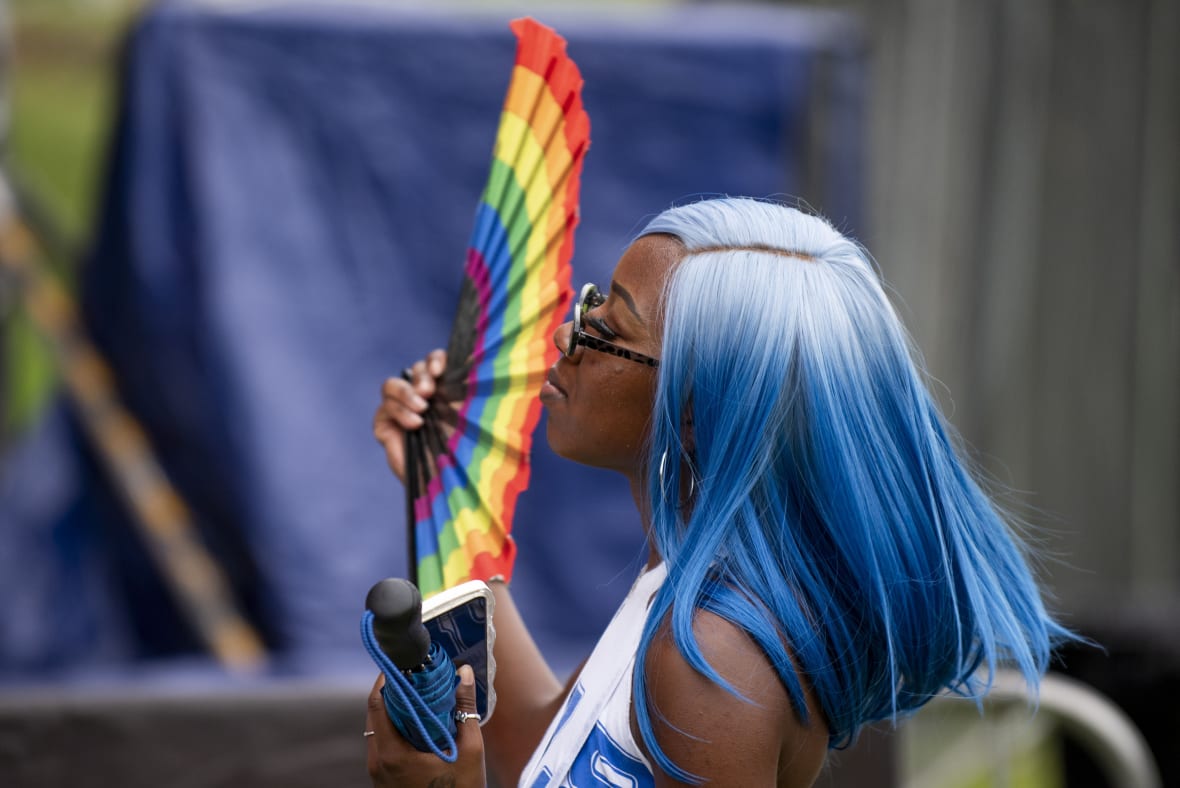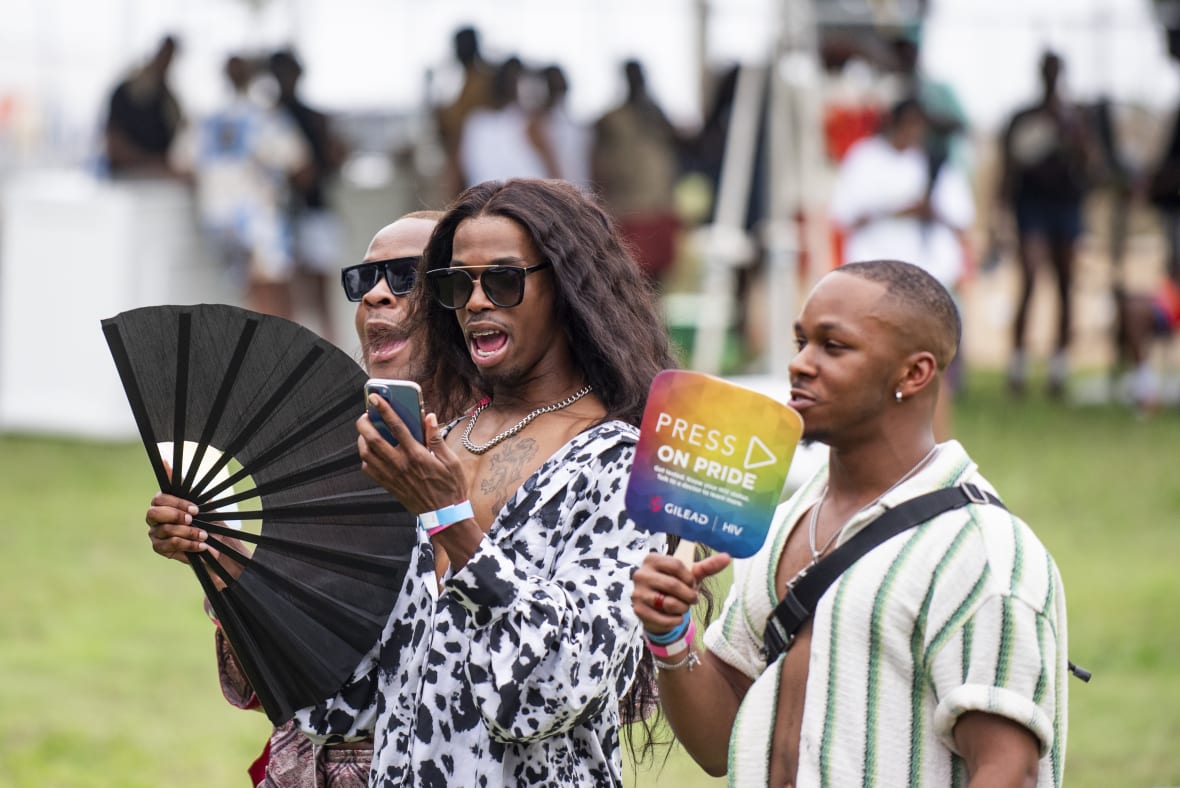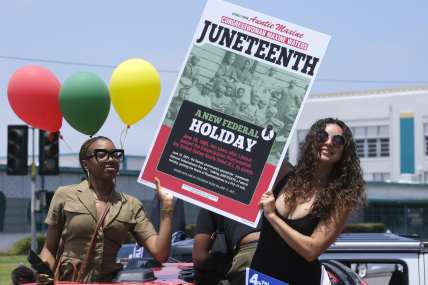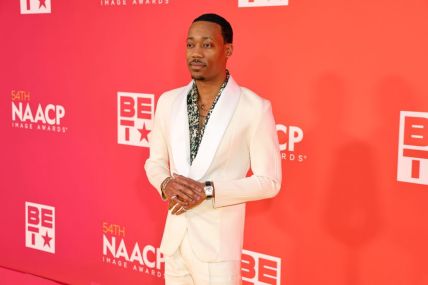Combining Pride, Juneteenth gave Black LGBTQ+ people a celebratory refuge
Dallas Southern Pride's events over Juneteenth weekend included everything from presentations from health experts to dancing late into the night.
DALLAS (AP) — From speaking at a health equity forum to striking a pose to the beats of a DJ set at a party on a pedestrian bridge, Naomi Green spent one weekend this month jumping from one event in Dallas to another that celebrated Juneteenth and Pride together.
“Sometimes I think the Black community forgets that LGBTQ people are still Black as well,” Green said. “And so we have the opportunity to really celebrate both of those at the same time because just because we’re LGBTQ doesn’t remove our Blackness. We’re both.”
As the lives of LGBTQ+ people are celebrated in June during Pride month, groups have found ways to merge those festivities with America’s newest federal holiday, Juneteenth, which marks the day in 1865 — over two years after the Emancipation Proclamation — that enslaved people in Galveston, Texas, were told they’d been freed. Such gatherings help highlight the struggles against discrimination Black and LGBTQ+ people have faced while celebrating those whose lives are a convergence of both identities in an inclusive atmosphere.

Organizers say it’s especially vital to have such events amid a political climate that’s been increasingly hostile to LGBTQ+ people. Transgender people have been particularly targeted with a growing number of laws and policies including restrictions on gender-affirming care, public bathroom use and participation in sports.
“It’s really important for us to have places where people look like us or people that are … allies of us to all come together and enjoy each other,” said Ahmad Goree, chief operating officer of Dallas Southern Pride, which hosts an annual Juneteenth Unity Weekend Celebration that brought thousands to the city this year.
Silver Tran attended the Unity Weekend festival and pool party with her wife, brother-in-law and best friend. She said they swam, ate barbecue and caught up with each other.
“You feel more comfortable being there because you are around other members of the LGBTQ community, so you don’t feel awkward or anything,” said Tran, who has attended the event for the last couple of years. “Everyone is just there to have a good time. No one is there to really judge you.”
Green, a transgender woman, said she appreciates that Dallas Southern Pride has been inclusive of the transgender community, which has seen several members killed in attacks in the city in recent years. Green said she believes education and visibility will help increase acceptance.
“We pay taxes, we work jobs, we have families, we have people who love us,” said Green, a marketing manager for a global firm. “We contribute to society, just like everyone else does.”
Trevon Mayers, senior director of advocacy and community engagement at New York City’s Lesbian, Gay, Bisexual & Transgender Community Center, said adding a Juneteenth celebration to the center’s Pride month festivities allows one to consider what freedom looks like “for the intersections of our community.”
“We often talk about the LGBTQ community not being a monolith, and that is also extended to the Black community,” Mayers said. “There are so many nuances and intricacies of what those community members look like and the diversity that exists within that space.”
Diante Webb said he was happily surprised to see so many people he knew at the center’s celebration, called Center the Culture: A Queer Juneteenth Block Party. “I was there with a friend and found out I was amongst a lot of friends,” he said.
“I think it’s so important to have spaces where queer people of color can gather,” said Webb, an executive assistant at an environmental organization. “There’s not often a lot in even larger cities like New York.”
A screening of “Black Panther” at Red Rocks Amphitheatre near Denver on Juneteenth was part of a lineup of Pride events put on by Black Pride Colorado, a program of Youth Seen, which helps Black LGBTQI people access mental health and wellness services.
The screening, which had an opening that included a drag performance, was the group’s first time doing a Juneteenth event, said tara jae, Youth Seen’s founder and executive director. Such events provide a place to “have fellowship and just really be seen,” said jae, who uses the pronoun they.

They said queer people often don’t feel welcomed at mainstream events. Even at the group’s Pride events, they said, attendees seemed to be “on alert” with heightened anxiety.
Dallas Southern Pride got its start in 1997 after LGBTQ+ community members didn’t feel like there was a place for them in the celebrations surrounding the annual football matchup in Dallas of two historically Black universities — Louisiana’s Grambling State and Texas’ Prairie View A&M.
“Back then, there were just no safe places for these community members to go and have a good time,” Goree said. “They didn’t feel comfortable going into the majority communities.”

How Juneteenth became a federal holiday
Goree said parties started being organized for LGBTQ+ people during that weekend. In 2016, they incorporated Juneteenth into the celebration.
Dallas Southern Pride’s events over Juneteenth weekend included everything from presentations from health experts to dancing late into the night. Booths set up at an evening pool party included a place for people to register to vote and where those taking HIV tests could get free concert tickets.
Outside of Austin on Lake Travis, dozens gathered this month for the Queer Black Women Alliance’s boat party for Juneteenth. Arijah Rashid, the alliance’s founder and president, said they grilled, chatted, danced and swam over the course of the evening.
“It’s nice to be able to find community and know that … you have a safe space to just be,” Rashid said.
TheGrio is FREE on your TV via Apple TV, Amazon Fire, Roku, and Android TV. Please download theGrio mobile apps today!

